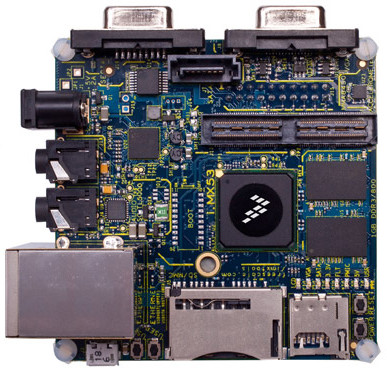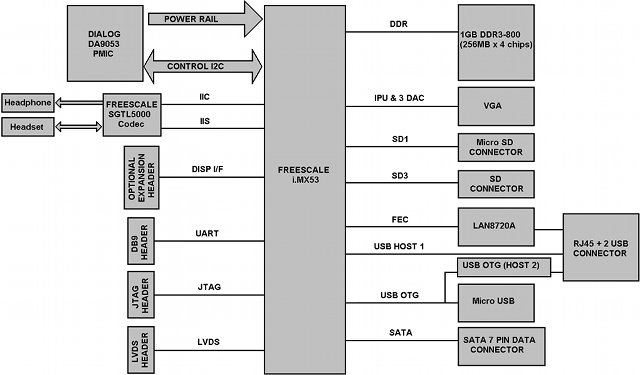Possibly inspired by Texas Instruments low cost Beagleboard (OMAP 3 – 129 USD) and Pandaboard (OMAP4 – 179 USD) and the large following in the development community, Freescale announced its own “Quick Start Development Board” based on i.MX53 for a cost of 149 USD.
i.MX53 QSD Board Hardware Description
Listed Hardware Features of the i.MX53 Quick Start Development Board:

- Processor
- i.MX53 1 GHz ARM Cortex-A8 Processor
- Power management IC
- 1 GB DDR3 memory
- Display
- LVDS connector
- VGA connector
- Parallel LCD add-on card (via expansion connector)
- HDMI add-on card (via expansion connector)
- Audio
- SPDIF output via HDMI add-on card
- Freescale SGTL5000 audio codec
- Microphone jack
- Headphone jack
- Expansion Connector
- Enables parallel LCD or HDMI output
- Camera CSI port signals
- I2C, SSI, SPI signals
- Connectivity
- Full-size SD/MMC card slot
- microSD card slot
- 7-pin SATA data connector
- 10/100 Base-T Ethernet port
- Two High-Speed USB host ports
- Micro USB device port
- Debug
- JTAG connector
- DB-9 UART port
- Miscellaneous
- 3” x 3” 8-layer PCB
- 3-axis Freescale accelerometer (MMA8450QT)
- 2A, 5V power supply
You can see the overview of the board with the connection diagram below.

Freescale also provides all necessary files including the schematics (PDF and OrCAD), bill of materials (BOM) and the gerber files on the download section of i.MX53 QSD Board.
The board can already be pre-ordered on Freescale website (Part No: MCIMX53-START) and is expected to be available on the 22-MAY-2011.
Two add-ons will also be available:
- A 24-bit HDMI output port for 49 USD
- A 4.3” 800×480 WVGA with 4-wire touch screen for 199 USD
i.MX53 QSD Board Software Development Kit
On the software side, Freescale provides Linux 2.6.35 source code and documentation for i.MX53 (Version 11.01), some Linux binary demo files, root file system for the Ubuntu images SDK and the Linux multimedia codecs documentation and sources for i.MX53. All available on the download section of i.MX53 QSD Board.
Developer support will be provided by http://www.imxcommunity.org and many partners including Adeano, ARM Limited, Boundary Devices, Calsoft, D2 Technologies, Device Solutions, Digi International, IAR Systems, Intrinsyc Software International, Linaro, Mentor Embedded and more.
Adeneo will supply Android 2.2 and Windows Embedded Compact 7 board support packages (BSPs) for the board, with Android 2.3 support said to be coming soon.
Linaro plans to support i.MX53 Quick Start board and deliver Linaro Evaluation Builds for Android 2.3 and 3.0 as well as Ubuntu 11.04.
Mentor Embedded will provide the Inflexion™ UI for i.MX processors at no additional cost in the Quick Start development system.
Processor
• i.MX53 1 GHz ARM Cortex-A8 Processor
• Power management IC
• 1 GB DDR3 memory
Display
• LVDS connector
• VGA connector
• Parallel LCD add-on card (via expansion connector)
• HDMI add-on card (via expansion connector)
Audio
• SPDIF output via HDMI add-on card
• Freescale SGTL5000 audio codec
• Microphone jack
• Headphone jack
Expansion Connector
• Enables parallel LCD or HDMI output
• Camera CSI port signals
• I2C, SSI, SPI signals
Connectivity
• Full-size SD/MMC card slot
• microSD card slot
• 7-pin SATA data connector
• 10/100 Base-T Ethernet port
• Two High-Speed USB host ports
• Micro USB device port
Debug
• JTAG connector
• DB-9 UART port
Miscellaneous
• 3” x 3” 8-layer PCB
• 3-axis Freescale accelerometer (MMA8450QT)
• 2A, 5V power supply

Jean-Luc started CNX Software in 2010 as a part-time endeavor, before quitting his job as a software engineering manager, and starting to write daily news, and reviews full time later in 2011.
Support CNX Software! Donate via cryptocurrencies, become a Patron on Patreon, or purchase goods on Amazon or Aliexpress




